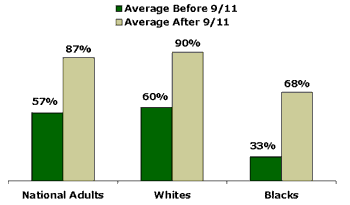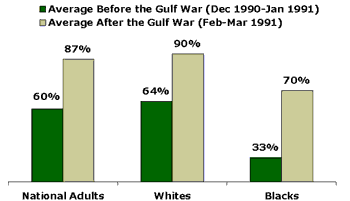GALLUP NEWS SERVICE
PRINCETON, NJ -- A special 优蜜传媒analysis shows that, while job approval for President George W. Bush increased substantially among both whites and blacks after 9/11, the gap between these two groups has remained roughly constant. The same general pattern occurred in the aftermath of the Gulf War, although President George H.W. Bush got a slightly higher proportionate increase in support among blacks in 1991 than his son has now.
In the seven months before the terrorist attacks, the current President Bush averaged a job approval rating of 57% among all adults in the country. In 10 polls conducted since 9/11, Bush's average has increased to 87% -- an extraordinary upsurge of 30 percentage points.
Bush job approval went up not only among the total general population, but among almost every measurable subgroup as well -- including racial and ethnic minorities. Although some poll observers have highlighted the fact that Bush approval has soared among blacks as an unusually significant occurrence, the Gallup analysis shows that the increase is what we would expect based on the overall level of change and historical patterns. The relative difference in white and black approval of Bush has remained roughly constant despite the overall increase in the numbers between both groups. Whites gave Bush a 27-point higher approval rating before 9/11 than did blacks, and have given Bush a 22-point higher approval rating after 9/11.
Specifically,
- The average level of support for Bush among blacks has more than doubled, from 33% prior to Sept. 11 to 68% now, an increase of 35 percentage points.
- Roughly the same pattern has occurred among whites. On average, six in 10 white Americans approved of Bush during his first seven months in office. Since Sept. 11, the average approval rating for Bush among whites is 90%, an increase of 30 percentage points.
- Thus, while the increase in black support for Bush was slightly greater than the increase in white support after 9/11, the racial gap persists, as the level of approval for Bush between both groups increased by similar amounts (30 and 35 points).
| Bush Approval Before and After 9/11 by
Race Do you approve or disapprove of the way George W. Bush is handling his job as president? |
 |
Bush the Elder's Approval Rating Pattern Similar in 1990 and 1991
This year's pattern of changes in job approval after Sept. 11 mirror those that occurred immediately after the Gulf War cease-fire in early 1991. Prior to the beginning of the Gulf War, Bush the elder had an average job approval rating of 60%. In the month following the conclusion of the Gulf War, that figure averaged 87% -- a jump of 27 percentage points.
One-third of blacks approved of Bush Sr. in the month prior to the war's commencement -- the same percentage who approved of the current Bush prior to Sept. 11. When the Gulf War concluded in Feb. 1991, the average approval rating of Bush among blacks increased by 37 points, with approval exceeding 70%. Approval of Bush among whites also increased after the Gulf War, but by a smaller amount, from 64% prior to the war to 90% after the war (an increase of 26 percentage points).
In short, the Gulf War increased support for then-President Bush substantially among both whites and blacks. The Sept. 11 attacks increased support for President George W. Bush in roughly the same way. In both situations, the white/black gap decreased only slightly, with a more significant narrowing of the gap in the 1991 situation.
| Bush Approval Before and After Gulf War by
Race Do you approve or disapprove of the way George Bush is handling his job as president? |
 |
|
National Adults |
Whites |
Blacks |
|
|
% |
% |
% |
|
|
George W. Bush |
|||
|
Before Sep 11 |
57 |
60 |
33 |
|
After Sep 11 |
87 |
90 |
68 |
|
Gap (After Sep 11 - Before Sep 11) |
30 |
30 |
35 |
|
George H.W. Bush |
|||
|
Before Gulf War (Dec 1990-Jan 1991) |
60 |
64 |
33 |
|
After Gulf War (Feb-Mar 1991) |
87 |
90 |
70 |
|
Gap (After Gulf War - Before Gulf War) |
27 |
26 |
37 |
Survey Methods
The results here are based on telephone interviews with a randomly selected national sample of adults, 18 years and older, conducted February-December 2001. For results based on this sample, one can say with 95 percent confidence that the maximum error attributable to sampling and other random effects is plus or minus 3 percentage points. In addition to sampling error, question wording and practical difficulties in conducting surveys can introduce error or bias into the findings of public opinion polls.
